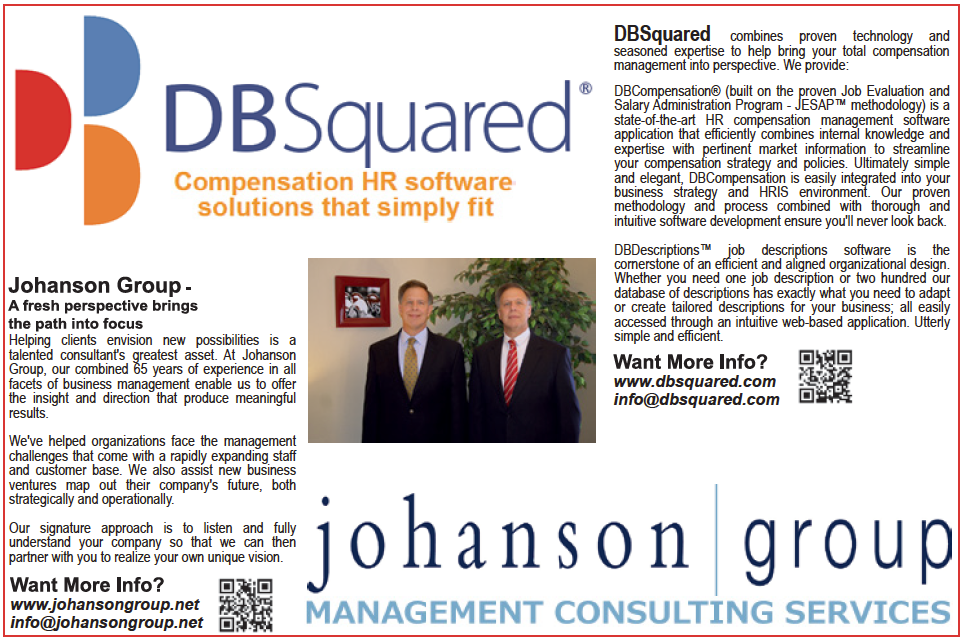By Blair and Bruce Johanson
After completion of Mercer’s 2020 US Compensation Monthly Pulse Survey, the following statement was made about post COVID-19 pandemic compensation and total rewards management strategies.
“The runway for this crisis is likely to be long and the impact uneven, which will result in a lot of complexity around managing pay and rewards, both across workforce segments and across locations,” said Mary Ann Sardone, Partner and US Talent Solutions Leader at Mercer.
Mercer offered the following three bulleted recommendations for human resources and compensation professionals that are front-line managers for employee-related issues associated with the pandemic crisis. We would like to add our insights and comments related to Mercer’s recommendation.
Take action to prepare for worst-case scenarios – not just for employee rewards and workforce composition changes, but also for actions that influence career development.
For some organizations, the runway for this crisis as mentioned in Mary Ann’s comment may be long and uneven, for other organizations the runway may not exist any more due two months of federal and state forced closed door regulations, and yet, for other essential businesses in retail food and goods, medical care and medications, shipping and home delivery, the crisis has tested their ability to keep up with demand and supply dynamics.
For worst-case scenario planning and decision-making, we recommend short-term and long-term action plans. Short-term action plans will focus on immediate employee rewards and workforce compensation changes to bring the business back online if it has been closed due to the COVID-19 virus pandemic or to bring employees back into the business or organization facilities after two months of remote work and/or alternating on-site staff coverage at public and private entities. Some of our clients are city governments, and they closed access to city halls to reduce the risk of virus spreading and they sent non-essential employees home to work remotely or to work flexible work schedules to handle on-site departmental needs. We have several banking clients that closed access to public lobby banking services but kept teller windows open to handle daily financial transactions.
For the short-term, human resource and compensation professionals will be working to help their businesses and organizations return to new post pandemic operational norms. Staffing will be the most immediate issue with some employees staying on FMLA leave to take care of themselves or children due to school closings and other pandemic-related health issues. In addition, staffing will be impacted by employees who have enjoyed working remotely so much that they have decided to terminate their employment so they can work for other organizations that offer remote or home employment since the two months of forced remote social distancing has proven equal or greater productivity by its remote workforce. Flexible work schedules and part-time to full-time evolving work progression decisions will be made as organizations return to full-time operations and workloads. Also, some employees may decide to stay on unemployment coverage until the end of 2020 based on favorable unemployment compensation.
We have handled several calls from clients during the past few months asking about compensation decisions for 2020 and 2021. The consensus of the phone calls to date is taking on a conservative, let’s wait and see approach for employee pay increases. Employers impacted negatively by the COVID-19 pandemic crisis that have not made 2020 employee pay adjustments will delay increases in employee pay, and they will re-evaluate 3rd or 4th quarter pay adjustments based on how quickly revenues return to pre-pandemic levels. Business sectors that basically closed down or minimized their services inclusive of restaurants, entertainment, travel and non-essential goods manufacturing will be happy to regain pre-pandemic operations and not worry with merit, market or COLA increases until 2021.
A recent International Monetary Fund (IMF) blog article written by Gita Gopinath and titled “The Great Lockdown: Worst Economic Downturn Since the Great Depression,” predicts that U.S. Year over Year 2020 GNP will be -6% and the World’s GNP will drop to -3%. Based on a March 17, 2020 Society of Human Resources (SHRM) article written by Stephen Miller, CEBS, “… most U.S. companies appear to be taking a wait-and-see approach to adjusting their compensation programs.
Have plans in place to provide HR support for these scenarios as well as the programs ready for support, such as severance, outplacement and re-boarding.
There are some employees that cannot wait to return to their offices or work areas as social distancing requirements are lifted. Some are happily working at their places of business and glad that remote working or days of unemployment have passed. These employees were not comfortable working from home based on family, pet and honey-do distractions. Parents became extended teacher aids due to school closings associated with the COVID-19 virus.
Human Resource and total rewards professionals need to be ready for, if not already addressing, requests from employees that want to continue working remotely or who have decided to seek employment with firms that support remote or home-based jobs. Post pandemic staffing fluidity will cause a period of outflows and back-filling inflows due to changing working conditions. As mentioned in Mercer’s article, severance, outplacement and re-boarding programs will address short-term staffing strategies during the upcoming 3rd quarter and this period could extend into the 4th quarter of this year.
During this time of upheaval, we are seeing some organizations that are laying off employees due to lack of business and at the same time, increasing salaries for top performers and key occupations that will sustain and grow the business coming out of the pandemic. Human Resources can be a key partner to the department heads of their organization and assist them to implement a logical and strategic plan to address essential workforce needs with a focus on the future goals and desired outcomes. Human Resources needs to be in the driver seat during this transition time to ensure objective and non-biased thinking and actions to ensure the best results of who stays and who goes.
Shrink decision-making and process execution timelines related to compensation planning processes to remain agile.
Agile compensation planning processes to decrease decision-making and process execution timelines as recommend by the Mercer Survey are accomplished by narrowing down the number of key decision-makers and being prepared with post-pandemic recommendations based on current trends and regulations. The CEO, CFO, COO, CHO and Chief Counsel for larger organizations and the Business Owner, Director of Finance, HR Director, Chief of Staff or Operations and Outside Legal Counsel for smaller organizations represent the core leadership team for responsive and agile total rewards short-term and long-term decisions.
There is a tendency to throw out the strategic plan when severe events occur. However, a thorough strategic plan should include contingencies for such times as we are in to assist with critical decisions around compensation, benefits, employee count, operations, etc. The core leadership team needs to lean into the long-term plan and make current day decisions that support the future and be ready to resume business as the pandemic declines and the economy improves.
One last thought. When crisis occurs, some Boards of Directors will try to micromanage and direct company leadership to reduce employee costs through employee layoffs, giving no pay increases, stopping incentive bonus plans, suspending 401(k) company contributions, etc. Management should be one step ahead of the Board and present three levels of severity: minimal, probable, and worst case to implement based on how the crisis is going to impact the organization. This will ease the stress level of the Board and also keep them from knee-jerking responses to a present crisis.
Blair and Bruce Johanson
Principle Partners
DBSquared
www.dbsquared.com

